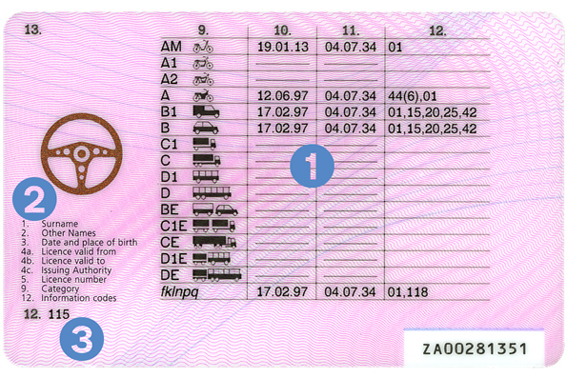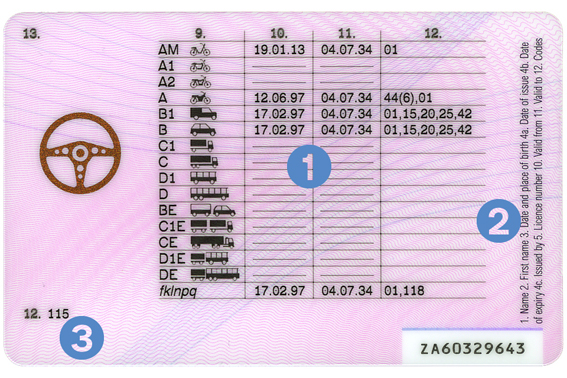Your licence explained
Changes to the front of the licence
The following changes will apply to the front of new driving licences:
- all dates will be shown as DD.MM.YYYY
- categories shown will be separated by a slash
- the date in 4b will show the licence expiry date
Changes to the back of the licence
From the 15 October 2012 to 18 January 2013, you’ll be issued with either photocard licence example A or example B. From 19 January 2013 you’ll be issued a photocard licence showing example B only.


The expiry date of your licence will be shown on the front in section 4b and the expiry date of your entitlements will be shown on the back of your licence.
The new style licence will look different to the current licence. All vehicle categories will be listed on the back of your licence with dates against those you are entitled to drive or ride. You won’t be entitled to drive any category of vehicle that has lines instead of dates. However, if you have passed a test in a larger vehicle you may still be entitled to drive or ride smaller vehicles of that type which have lines shown instead of dates, eg holders of full category A would be entitled to ride a category A2 vehicle.
Licence counterpart
Your photocard licence is accompanied by a paper counterpart. The counterpart will contain your provisional driving entitlements, driving offences and other relevant information.
Lorry, bus and minibus licence holders
If you apply to claim your first lorry or bus test pass or renew your driving licence on or after 19 January 2013, the licence issued will be valid for a maximum of 5 years. This affects you if you have passed driving tests for categories C1, C, D1, D, C1E, CE, D1E or DE.
Once you’ve been issued with a 5 year licence you’ll need to renew the licence when it expires - the licence expiry date is shown in 4b. To renew the licence and to renew your lorry and/or bus entitlement you’ll need to fill in the application and medical questions on an ‘Application for a lorry, bus or minibus driving licence’ (D2) or the renewal reminder form which we send you.
If you’ve already passed a driving test in one of the above categories, the new rules will apply when you next renew your driving licence or when you renew your lorry and/or bus entitlement, whichever is earlier.
Your categories explained
Mopeds (AM and q)
All licences issued on or after 19 January 2013 will show moped categories as AM and q in place of category p. But if you held full category p before this date you’ll keep this entitlement and it will be shown on your licence together with new categories AM and q.
Motorcycles (A1, A2 and A)
There are different minimum age restrictions and power outputs for the different categories. If you are an existing tricycle rider you won’t lose the entitlement you currently hold.
Tests for mopeds with 3 or 4 wheels, A1 and A tricycles and sidecar combinations will only be offered to physically disabled drivers or riders.
Tricycles (AM, A and A1)
There are varied minimum age restrictions and power outputs for the different categories. If you are an existing tricycle rider with a full licence, you won’t lose the entitlement you currently hold.
Tests for mopeds with 3 or 4 wheels, A1 and A tricycles and sidecar combinations will only be offered to physically disabled drivers or riders.
Drivers who tow trailers
If you’ve passed your car (category B) test on or after 19 January 2013 and you want to tow a trailer weighing more than 3,500 kilograms with a car or small vehicle (category B and B+E), then you’ll need to pass a test for category C1E.
If you got your driving entitlement before 19 January 2013 you will retain it. There are no further changes to rules on towing trailers.
For further information on towing trailers please see booklet Requirements for towing trailers in Great Britain (INF30) (PDF 488kB).
New categories and category changes from 19 January 2013
| Category | Description | Minimum age | Notes |
|---|---|---|---|
| p | Moped - Motor vehicles with fewer than 4 wheels with a maximum design speed exceeding 45 kilometres per hour (km/h) but not exceeding 50km/h and which, if propelled by an internal combustion engine, has a cylinder capacity not exceeding 50cc. | 16 | See note 4 |
| q | Moped - Motor vehicles with fewer than 4 wheels which, if propelled by an internal combustion engine, has a cylinder capacity not exceeding 50cc and, if not equipped with pedals by means of which the vehicle is capable of being propelled, has a maximum design speed not exceeding 25km/h. | 16 | See note 4 |
| AM | Moped - 2-wheel vehicles or 3-wheel vehicles with a maximum design speed of over 25km/h and not more than 45km/h. Light quadricycle With an unladen mass of not more than 350kg, not including the mass of the batteries in the case of electric vehicles, whose maximum design speed is over 25km/h and not more than 45km/h. | 16 | |
| A1 | Motorcycles - A motorcycle with a cylinder capacity not exceeding 125cc, of a power not exceeding 11kW and with a power to weight ratio not exceeding 0.1kW per kg. A motor tricycle with a power not exceeding 15kW. | 17 | |
| A2 | A motorcycle of a power not exceeding 35kW, with a power to weight ratio not exceeding 0.2kW per kg and not derived from a vehicle of more than double its power. | 19 | See note 5 |
| A | A motorcycle of a power exceeding 35kW or with a power to weight ratio exceeding 0.2kW per kg, or A motorcycle of a power not exceeding 35kW with a power to weight ratio not exceeding 0.2kW per kg and derived from a vehicle of more than double its power. A motor tricycle with a power exceeding 15kW. | 24 | See note 1 and 5 |
| B1 | 4 wheeled light vehicles - Motor vehicles with four wheels up to 550kg unladen and invalid carriages. | 17 | |
| D1 | Minibuses - Vehicles with no more than 16 passenger seats in addition to the driver and with a maximum length not exceeding 8 metres with a trailer up to 750kg. | 21 | See note 2 and 3 |
| D | Buses - Any bus designed and constructed for the carriage of more than 8 passengers in addition to the driver, with a trailer up to 750 kg. | 24 | See note 2 |
| D1E | Minibuses with trailers - Vehicles with no more than 16 passenger seats in addition to the driver and with a maximum length not exceeding 8 metres with a trailer over 750 kg, provided that the MAM of the combination formed does not exceed 12,000kg. | 21 | See note 2 and 3 |
| DE | Buses with trailers - Any bus designed and constructed for the carriage of more than 8 passengers in addition to the driver, with a trailer over 750 kg. | 24 | See note 2 |
For information on C category vehicles see ‘Further information’ section below.
Note 1
Age 24 or 2 years from date of Standard A2 test pass.
Tricycle restriction code 79 (tri).
Note 2
You can drive at age 17 if you are a member of the armed forces.
You can drive these vehicles at age 18 if one of the following apply:
(i) You are learning to drive or taking a PCV test or Driver CPC initial qualification
(ii) Having passed a PCV driving test and Driver CPC initial qualification, you can drive if you’re:
- driving on a regular service where the route doesn’t exceed 50km
- not engaged in the carriage of passengers
- driving a vehicle of a class included in sub-category D1
(iii) Having passed a PCV test before 10 September 2008 and driving under a bus operator’s licence, or minibus permit, or community bus permit and any of the following conditions:
- driving on a regular service where the route doesn’t exceed 50km
- not engaged in the carriage of passengers
- driving a vehicle of a class included in sub-category D1
You can drive at age 20 after passing a PCV driving test and Driver CPC initial qualification.
For further advice you can contact the Driving Standards Agency by phoning 0300 200 1122.
You can drive at age 21 for categories D and DE if:
- the vehicle is being used by the fire service or for maintaining public order
- undergoing road tests for repair or maintenance purposes
- you were entitled to drive the vehicle before 19 January 2013
Note 3
If you passed your test for category B or B automatic before 1 January 1997 your licence will already show entitlement to C1, C1E (8.25 tonnes), D1 and D1E (not for hire or reward).
Note 4
National category only.
Note 5
You can drive at age 17 if you are a member of the armed forces.
Further information on driving licences
Please see booklet Information on driving licences (INS57P) (PDF, 1,402KB).
The DVLA uses a Royal Mail postcode package to update address details. If you want your house name included in your address, you will need to contact your local authority for advice on how to do so.
